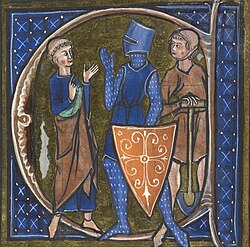
Back Landadel Afrikaans Джэнтры Byelorussian Džentry Czech Gentry German Gentry Spanish اشراف Persian Maalaisaateli Finnish Gentry French भद्रवर्ग Hindi Dzsentri Hungarian

Gentry (from Old French genterie, from gentil 'high-born, noble') are "well-born, genteel and well-bred people" of high social class, especially in the past.[1][2] Gentry, in its widest connotation, refers to people of good social position connected to landed estates (see manorialism), upper levels of the clergy, or long established "gentle" families of noble descent, some of whom in some cases never obtained the official right to bear a coat of arms. The gentry largely consisted of landowners who could support themselves entirely from rental income or at least had a country estate; some were gentleman farmers. In the United Kingdom, the term "gentry" specifically refers to the landed gentry: the majority of the land-owning social class who typically had a coat of arms but did hold a peerage. The adjective "patrician" ("of or like a person of high social rank")[3] describes comparable elite groups in other analogous traditional social elite strata based in cities, such as the free cities of Italy (Venice and Genoa) and the free imperial cities of Germany, Switzerland, and the Hanseatic League.[a]
The term "gentry" by itself, Historian Peter Coss argues, is a broad construct applied by scholars to different societies, sometimes in ways that do not fully align with historical realities. Whilst no single model perfectly fits every society, some scholars favour a unified term to describe these upper social strata.[4][5]
- ^ "Gentry". THE GENTRY | meaning in the Cambridge English Dictionary. Advanced Learner's Dictionary. Cambridge. Archived from the original on 2020-11-12. Retrieved 2021-12-14.
- ^ "Gentry". English Dictionary. Oxford.[dead link]
- ^ "Patrician". Patrician - Definitions available for patrician from Cambridge Dictionary Online: Free English Dictionary and Thesaurus. Dictionary. Cambridge. Archived from the original on 2010-12-05. Retrieved 2010-11-05.
- ^ "The Origins of the English Gentry". Reviews in History. Archived from the original on 2018-06-27. Retrieved 2019-10-07.
- ^ "The Origins of the English Gentry Peter Coss" (PDF). Archived (PDF) from the original on 2011-06-06. Retrieved 2010-03-09.
Cite error: There are <ref group=lower-alpha> tags or {{efn}} templates on this page, but the references will not show without a {{reflist|group=lower-alpha}} template or {{notelist}} template (see the help page).
© MMXXIII Rich X Search. We shall prevail. All rights reserved. Rich X Search